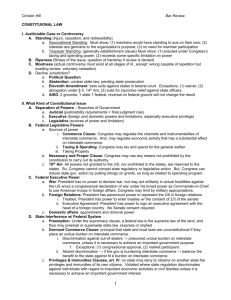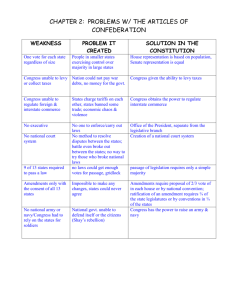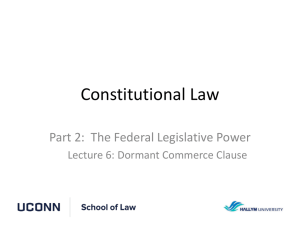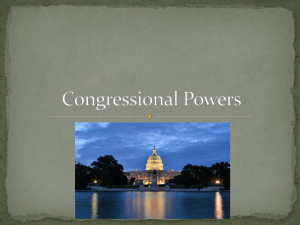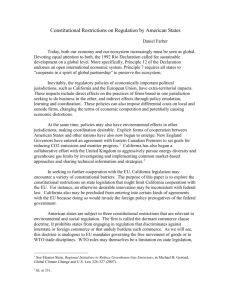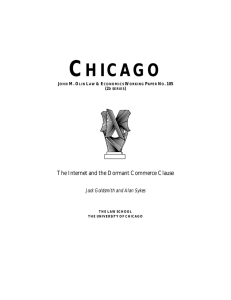Spring 2012 Constitutional Law Black Letter Outline III III. State
advertisement
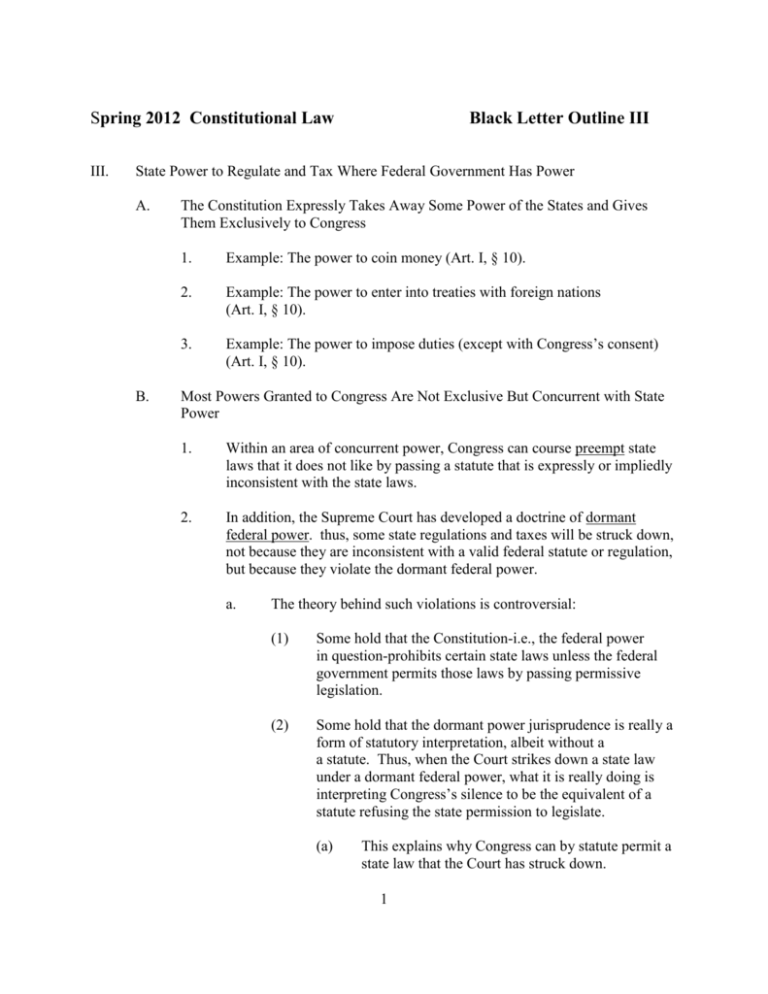
Spring 2012 Constitutional Law III. Black Letter Outline III State Power to Regulate and Tax Where Federal Government Has Power A. B. The Constitution Expressly Takes Away Some Power of the States and Gives Them Exclusively to Congress 1. Example: The power to coin money (Art. I, § 10). 2. Example: The power to enter into treaties with foreign nations (Art. I, § 10). 3. Example: The power to impose duties (except with Congress’s consent) (Art. I, § 10). Most Powers Granted to Congress Are Not Exclusive But Concurrent with State Power 1. Within an area of concurrent power, Congress can course preempt state laws that it does not like by passing a statute that is expressly or impliedly inconsistent with the state laws. 2. In addition, the Supreme Court has developed a doctrine of dormant federal power. thus, some state regulations and taxes will be struck down, not because they are inconsistent with a valid federal statute or regulation, but because they violate the dormant federal power. a. The theory behind such violations is controversial: (1) Some hold that the Constitution-i.e., the federal power in question-prohibits certain state laws unless the federal government permits those laws by passing permissive legislation. (2) Some hold that the dormant power jurisprudence is really a form of statutory interpretation, albeit without a a statute. Thus, when the Court strikes down a state law under a dormant federal power, what it is really doing is interpreting Congress’s silence to be the equivalent of a statute refusing the state permission to legislate. (a) This explains why Congress can by statute permit a state law that the Court has struck down. 1 (b) b. 3. But what about evidence of Congressional intent vis-a-vis state laws that fall short of a statute? E.g., failure to pass a law striking down or consenting to state laws when issue clearly raised in Congress? Some Justices believe that the entire dormant federal power jurisprudence is misconceived. Justice Black did in the past. Today, Justice Scalia does. Special Area of Dormant Federal Jurisprudence: the Dormant Commerce Clause. a. The import to and export from other states of goods and services. (1) The basic principle here is anti-protectionism: the state may not regulate or tax to protect local producers, processors, or consumers over producers, processors, and consumers from out of states. Such protectionist legislation is within the domain of concurrent power in which it is unconstitutional unless permitted by a federal statute. (a) The Court decisions seemed designed to ferret out protectionist intent. (See Dean Milk Co. v. Madison, p. 274, involving a ban on milk pasturized beyond a certain distance from the city struck down as protectionist because less restrictive alternatives were available; Hunt v. Washington State Apple Advertising Commission, p. 297, involving a ban on apples using grading system other than North Carolina’s struck down as protectionist). (b) Yet mere disparate adverse impact on the producers, etc., of other states usually does not result in invalidation, even in suspicious circumstances. (See Minnesota v. Cloverleaf Creamery, p. 299). (c) Examples: i) Protectionist bans on imports held unconstitutional: a) Baldwin v. Selig, p. 271 (state law eliminating price advantage of out of state 2 milk). Note problem of extra-territorial effect. ii) b) Philadelphia v. N.J., p. 276 (state law forbidding importation of waste from out of state). c) Bacchus Imports v. Dias, p. 340 (state tax exemption for local wine). d) Wyoming v. Oklahoma, p. 270 (law requiring Oklahoma utilities to use Oklahoma coal). e) West Lynn Creamery v. Healy, p. 315 (tax of sale of milk with proceeds going to local milk producers). f) Camps Newfound/Owatonna v. Harrison, p. 318 (discriminatory tax applied to customers from out-of-state held unconstitutional). g) New Energy v. Limbach p. 314 (tax discrimination against out of state product struck down and distinguished from subsidy of in-state product). Protectionist restrictions on exports held unconstitutional: a) Carbone v. Clarkstown, p. 285 (law requiring all local waste to be shipped to municipally funded waste transfer station). But see United Haulers, p. 287, and Dept. of Revenue v. Davis, p. 293, for a retreat from Carbone. b) Hood v. DuMond, (mentioned in class) (restriction on export of milk). c) Sporhase v. Nebraska, p. 281 3 (restriction on export of water). iii) (2) d) Foster-Fountain Packing v. Haydel, (mentioned in class) (restriction on shipping local shrimp to out-of-state processors). e) Hughes v. Oklahoma, p. 281 (embargo on shipping Oklahoma minnows out-of-state struck down). f) Pike v. Bruce Church, p. 271 (requirement that state-grown cantloupes be packed in Arizona struck down). Disproportionate impact on out of state interests in itself does not violate commerce clause. a) Exxon Corp v. Md., p. 300 (ban on vertical integration of gasoline business affecting out-of-state companies held constitutional). b) Commonwealth Edison v. Montana, p. 337 (severance tax on coal, which was mainly consumed out of state, was constitutional because fairly related to services provided by taxing state). c) Breard v. Alexandria, p. 296 (ban on doorto-door solicitation which gave advantage to local merchants). d) Several cases uphold price controls so long as they are non-discriminatory and don’t affect out of state sales. See, e.g., Parker v. Brown, (mentioned in class). Exceptions to the basic principle of anti-protectionism regarding exports and imports. (a) Quarantines: A state may ban imports from another state for a valid quarantine purpose: See Maine v. Taylor, p. 280. 4 (3) (b) Market participant doctrine: The Supreme Court has allowed states to discriminate in favor on local business or consumers when the states are acting as participants in the market, i.e., buying and selling goods. See Reeves v. Stake, p. 322. The state may not, however, impose “downstream restrictions” that are discriminatory against other states. See Wunnicke, p. 326. (c) Subsidies: A state subsidize local businesses. (d) Note: It is difficult to distinguish regulations, market participation, and subsidy. See, e.g., West Lynn Creamery, Bacchus Imports, Limbach, and Dept. of Revenue v. Davis. (e) Congressional authorization: Congress may authorize protectionist state laws. See p. 282. (But only if they don’t violate equal protection or privileges and immunities clauses.) Cognate constitutional doctrines that affect state discrimination against other states in the commercial realm. (a) The Privileges and Immunities Clause of Art IV. i) Applies only to natural persons. ii) Applies only to some interests- for example, to business and trade but not recreational hunting. iii) Applies to municipal discrimination in favor of citizens of city. See United Building & Construction Trades v. Camden, p. 329. iv) Requires equality of treatment between states’ own citizens and citizens of other states unless a legitimate reason exists for distinguishing out-of-staters. v) The Art. IV P&I Clause work as sort of an 5 exception to the market participant exception. (b) The Equal Protection Clause of the 14th Amendment. i) Applies to corporations as well as to natural 6 persons. ii) (c) b. Requires that all discrimination by state rationally relate to a legitimate state purpose. Favoring local insurance business was held to be an illegitimate state purpose in Metropolitan Life Ins. v. Ward, p. 284. Note: Congress may not authorize state laws would otherwise violate the P&I clause or the equal protection clause. See Metropolitan Life Ins. v. Ward. Obstruction of interstate commerce. (1) (2) Transportation. (a) The Court has purportedly adopted a balancing test for state laws that obstruct interstate transportation, though laws that actually serve a safety purpose are upheld. What varies is the degree of deference the Court gives the state’s finding that safety is served. Compare the deference shown in So. Car. v. Barnwell Bros., (restriction on width of trucks upheld despite major obstacle to interstate truck traffic) with the lack of deference shown in So. Pacific v. Arizona, p. 307, and Kassel v. Consolidated Freightways, p. 308. It is not clear that the Court will actually balance the state interest against the federal interest if the state interest is clear and the law nondiscriminatory. See Barnwell. Usually the Court invalidates the state law on the ground that the state interest is illusory (So. Pac.; Kassel), or discriminatory (Kassel concurrence). (b) In the opinion of some justices, the state may not attempt to divert interstate traffic around it. See Kassel v. Consolidated Freightways. At least it cannot do so if it attempts to cushion the effects on in-state interests. The obstruction of conflicting regulations. 7 C. D. (a) The dormant commerce clause may be violated by state laws of a type that, if adopted by other states, could burden interstate commerce. (b) Examples: i) Conflicting transportation regulations. See Bibb v. Navajo Freight Lines, p. 314. ii) Other regulations of all types may create burdens on interstate commerce. For example, inconsistent commercial codes, inconsistent product-liability laws, different taxing schemes etc. These are rarely struck down, however. Extra-territorial Legislation (1) State may not regulate out-of-state transactions of non-state corporations. See Edgar v. Mite, p. 306. Contrast with CTS, p. 302 (regulation of sale of control of in-state corporation upheld even if most shareholders are out-of-state). (2) State may not require interstate seller to sell at prices in other states. See Brown-Forman Distillers, p. 306. Nondiscriminatory State Taxes (1) Taxation of interstate businesses must meet Complete Auto Body 4-part test (see p. 337). (2) “Fairly related” prong is probably toothless, even if state has monopoly leverage. See Commonwealth Edison, p. 337. (3) Multistate corporations must be taxed by allocation of income that is internally consistent -- if every state followed formula, total wouldn’t be more than 100% of income -- and externally consistent, reflecting realistic appraisal of where the income is earned. See Container Corp., p. 340. (4) Nexus between state and taxable transaction is stricter under Dormant Commerce Clause than under Due Process Clause. 8 Congress can overturn the former but not the latter. Rev. 02-28-12 9
